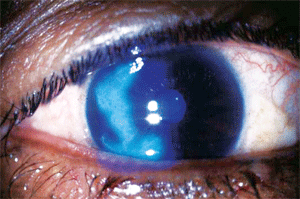 Q: I have a few patients who have been using long-term antiviral suppression in order to minimize the risk for recurrent herpes simplex keratitis (HSK). Since they have been using 400mg of acyclovir b.i.d., I have not seen any recurrence. How long do you continue the treatment, and do you routinely check renal and liver function?
Q: I have a few patients who have been using long-term antiviral suppression in order to minimize the risk for recurrent herpes simplex keratitis (HSK). Since they have been using 400mg of acyclovir b.i.d., I have not seen any recurrence. How long do you continue the treatment, and do you routinely check renal and liver function?
A: Prophylaxis with oral anti-viral agents has become an integral component of managing recurrent HSK. In the Herpetic Eye Disease Study (HEDS) II, the Acyclovir Prevention Trial evaluated the role of oral acyclovir in the prevention of recurrent herpes simplex eye disease in eyes without active infection. Results showed that 400mg of oral acyclovir taken twice a day decreased the recurrence rate of any type of ocular herpes simplex virus by 41%.1
“While those randomized to treatment in the Acyclovir Prevention Trial took oral acyclovir for a period of 12 months, I typically maintain treatment indefinitely, unless contraindicated or unless the patient cannot tolerate the medication,” says Kelliann Dignam, O.D., of the Baltimore VA Medical Center. “Should the patient experience a recurrent episode of herpes simplex, I typically increase the dosage frequency of 400mg oral acyclovir to five times a day for seven to 10 days, in addition to adding the appropriate topical anti-viral and/or anti-inflammatory agents.”
Essentially, treatment needs to be maintained indefinitely to remain effective because HEDS showed there was no lasting effect after it was discontinued.
“There are reports in the literature of patients being successfully managed on suppression therapy for upward of 10 years,” says Marc Myers, O.D., of the Coatesville VA Medical Center in Pennsylvania. “Customarily, evaluating tolerance to therapy at six months is advised, and if no adverse response is discovered, annual examination is recommended.”

Once acute presentation of HSK has been resolved, what’s the best way to manage prophylaxis with oral anti-viral medications? Photo: Brad Sutton, O.D.
The most significant contraindication for acyclovir is severe renal dysfunction. So, closely monitor patients with a medical history of impaired renal function because acute and long-term use of acyclovir may result in renal failure.
“It may be beneficial to inform the patient’s primary care physician of chronic acyclovir use because testing of renal and liver function can then be incorporated into routinely performed laboratory analysis,” says Brad Sutton, O.D., associate clinical professor at Indiana University’s School of Optometry.
Dr. Sutton recommends discussing chronic prophylaxis with oral acyclovir for all patients who suffer from HSK, especially those who have experienced even a single episode of stromal keratitis.
“Scarring related to stromal disease can lead to significant vision loss, so decreasing the number of recurrent attacks is vital in these patients,” he says. “For patients who have experienced only dendritic epithelial disease, it is acceptable to wait until they have shown a propensity to have recurrent attacks before instituting prophylaxis with acyclovir.” Studies have not been conducted looking at efficacy with other oral anti-viral medications.
1. Herpetic Eye Disease Study Group. Acyclovir for the prevention of recurrent herpes simplex virus eye disease. N Engl J Med. 1998 Jul 30;339(5):300-6.

